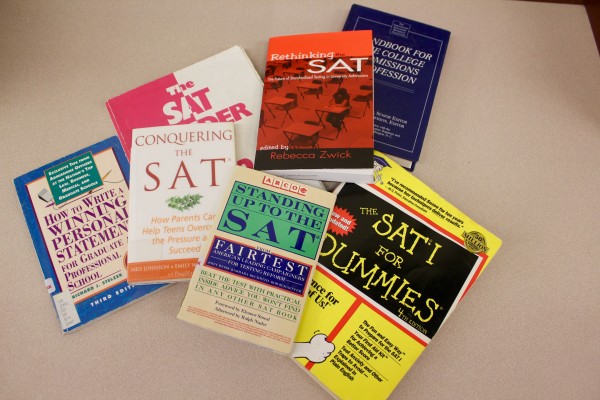Fordham Admissions Adjusts to New SAT Format
The SAT Prep book selection at Quinn Library might need to be updated after the new tests are put in place. (PHOTO BY SOFIA ALVAREZ/ THE OBSERVER)
April 8, 2016
For the newest cycle of applications, the Fordham Admissions department will be dealing with a unique challenge: a new SAT. As of March 5, the College Board will be administering the new version of the SAT in an effort to better reflect high school curricula.
The new SAT, according to the College Board, is designed to more closely resemble the math and vocabulary high school students are learning in the classroom, and eliminates the score penalty for wrong answers. In addition, the College Board has launched the Khan Academy, a program that offers free test preparation to students.
However, experts have said that the new reading passages are longer than they previously were and that the math questions—mostly word problems—provide challenges that are disadvantageous to non-English speakers and other students who do not find math to be their strong suit.
Fordham University’s Admissions Department has recently begun to adjust to the new SAT, but is waiting for data from the College Board before proceeding further. Data from this first administration of the new exam will not be sent by the College Board until early summer, according to Patricia Peek, Ph.D. and director of undergraduate admission at Fordham. Until the Admissions Department receives the College Board data, which will include how strongly the new test correlates with what high school students learn in schools, it will not make widespread changes, Peek confirmed.
Until then, Admissions will be accepting both the old and the new versions of the SAT, in addition to the ACT. “We will accept the best score of the new or old test,” Peek said.
The department will still superscore SAT exams, but the scores from the new test and the old test will not be combined. “We are treating them as two separate tests,” Peek said. This information is detailed in the Admissions section of Fordham University’s website.
Regarding the concerns surrounding the changes to the SAT, Peek believes that the College Board is taking many steps in the right direction with the exam. The College Board is “emphasizing more relevant vocabulary and math, which aligns with what [students] are learning,” Peek said. Peek also considers the elimination of the penalty for guessing on the SAT’s multiple choice questions to be a strong decision that will benefit students, and finds the Khan Academy to be “positive.”
Although SAT scores are found on approximately 81 percent of applications submitted by accepted students at Fordham as of fall 2014, according to the National Center for Education Statistics, Peek said that the test is not the most important part of reviewing a prospective student’s transcript. The SAT helps the Admissions Department understand how students perform certain tasks, but “it is a holistic application review,” Peek said.
The Admissions department looks more at a prospective student’s high school career to determine whether or not to give acceptance. “Academic performance, rigor of program and trend in grades are very important,” Peek said.
The department also looks at prospective student’s SAT essay, if they submit it with their application, as well as their extra curricular activities. These different elements are reviewed in order to admit students who “are a good fit at Fordham,” according to Peek.










